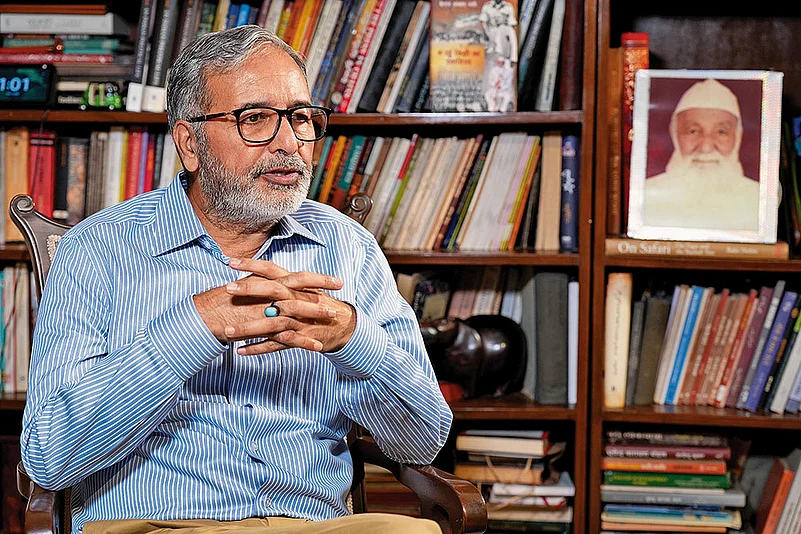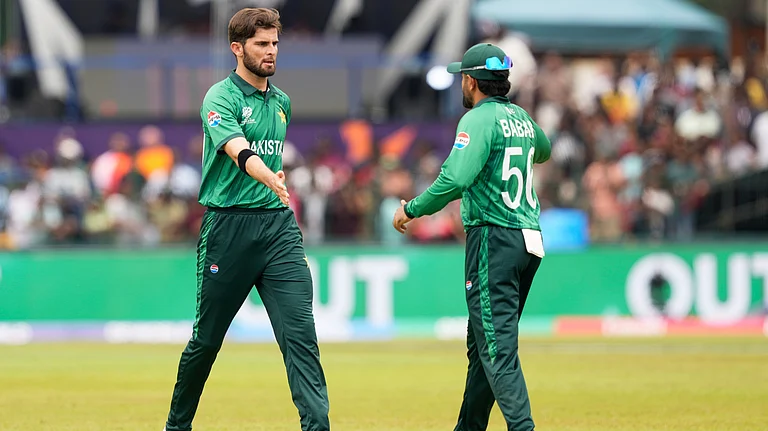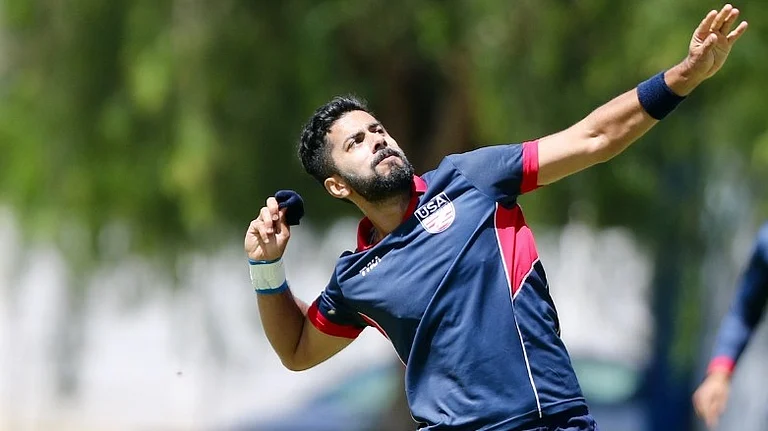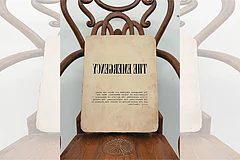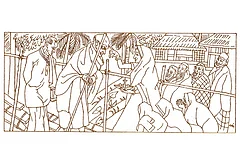This article was published in the Outlook magazine issue 'Emergency: The Legacy/The Lunacy' dated October 1, 2024. To read more article from the issue, click here.
Qurban Ali is a senior journalist and son of former freedom fighter and Socialist leader Captain Abbas Ali, who was jailed for 19 months by the Indira Gandhi government during the Emergency. In the backdrop of the recent controversy regarding the release of the Bollywood film Emergency, featuring Bharatiya Janata Party (BJP) MP Kangana Ranaut in the lead role, and the BJP’s push for ‘Samvidhan Hatya Diwas’ to commemorate 50 years of the Emergency, Ali spoke to Outlook about the “dark days” and the political legacy of the Emergency. He has keenly followed India’s freedom struggle and is now documenting the history of the Socialist movement in the country.
My father was very fond of going to jail. Before Independence, he was arrested by the British government in India, court martialled, and sentenced to death for marching with Subhash Chandra Bose’s Azad Hind Fauj (INA). Saved by Independence, he spent the next decades of his newfound freedom in and out of prison. As part of the Socialist movement, he was jailed about 50 times between 1948 and 1974 for demonstrating different forms of civil disobedience. His toughest incarceration, nevertheless, was the last one during the Emergency, imposed by Indira Gandhi on June 25, 1975. I was about 12 years old at the time. Yet, memories of those days come back to me in a whirl of pamphlets, slogans, protests and resistance, like it was just yesterday.
We were at my nana’s (maternal grandfather) house in a remote village in Aligarh when we heard about the Emergency and the mass arrest of political workers and Opposition leaders. It was the peak of the JP (Jayaprakash Narayan) movement and my father, a popular Socialist leader in Uttar Pradesh (UP) at the time, had been participating in demonstrations being held across the country since the June 12, 1975 Allahabad High Court judgement, of which my father had been a witness. We knew he was likely to be arrested, and he was. But his arrest was not made public. For nearly two months, we searched high and low for him but without a clue. We did not know which jail he was in, under what charges he was arrested, or whether he was even alive.
It was a dark time. Rumours of custodial torture of political prisoners were rife and some even claimed a ‘slow poison’ of some kind was being used to kill the prisoners. There was no media, no civil liberties or civil society, the judiciary had ceased to function independently and there was complete press censorship and muzzling of dissent. Overnight, thousands of people like my father were in jail.
After two months, we received a letter he wrote from Bulandshahr jail, informing us that he had been arrested under allegations of attempting to remove railway tracks to derail trains. He was first arrested under the Defence India Rule (DIR) and then the Maintenance of Internal Security Act (MISA) too was imposed. He was shifted to Bareilly Central jail, infamous at the time for alleged excesses, and later to Naini jail after he filed a habeas corpus petition in Allahabad High Court challenging his arrest. He remained in prison for 19 months.
I remember going to jail to meet him along with my mother and sisters. We would carry food prepared at home, especially on festival days like Eid. And there would be celebrations of Holi-Diwali too. The prison authorities used to be sympathetic toward political prisoners and treat them with respect.
By the time he was released and he returned home, we were practically bankrupt. My father even refused a ticket to contest the Lok Sabha election Indira Gandhi had announced, citing financial instability. Even so he was content and he campaigned spiritedly for candidates of what later came to be called the Janata Party—an amalgamation of five political groups including the Bhartiya Jan Sangh, the Congress (O), the Bharatiya Lok Dal, the Socialist Party and later, Jagjivan Ram’s Congress for Democracy (CFD). The Janata Party, which was formed formally three months after coming to power, won with a thumping majority.
The Emergency had ended. And a new era of social justice politics seemingly awaited. As it turned out, the end of the Emergency also became the end of the Socialist movement, which was reduced merely to the “politics of anti-Congressism” before transmogrifying into the brute religious majoritarianism of today.
***
My father had been in prison in Multan Fort when India was partitioned. By the time he returned home, most of our relatives had moved to Pakistan. He chose to remain in India as he believed that by doing so, he could be true to his ideas of nationalism, secularism and democracy. In 1948, he joined the Socialist Party (SP) led by Acharya Narendra Deva, Jayaprakash Narayan and Ram Manohar Lohia. He remained associated with all the Socialist streams, namely, the Praja Socialist Party (PSP), the Samyukta Socialist Party (SSP) and the SP until its merger with the Janata Party in 1977.
I inherited his political interest fairly early, following him around and participating in the popular movement brewing in UP-Bihar, what we called at the time the Sampurna Kranti Movement or simply the JP movement. I saw JP for the first time when he came to my hometown Khurja in 1974. When he gave the call for “Dilli Chalo” on March 6, 1975, I went with my father to the national capital and marched in the name of Socialism. I, and perhaps my father too, realised at a later stage that it wasn’t just the Socialists answering JP’s call. The Rashtriya Swayamsevak Sangh (RSS) was also consolidating behind JP’s call to unite the Opposition against the Congress.
Nearly 50 years since the Emergency, many who had at the time submitted ‘‘Maafi Namas’’ to the Indira government, are now the most spirited anti-Emergency crusaders.
On the night before the Emergency, JP and other leaders of the Opposition commanded a massive rally at Delhi’s Ramlila Maidan, a key trigger for the Emergency to be imposed when it was. Additionally, leaders like Lohia were redefining Socialist ideology to include religious undertones. Though Lohia’s political philosophy was critical of using religion for politics, he did not shy away from invoking Ram, Krishna and Shiva when needed, in order to appease the electorate. It was perhaps the Socialists’ way to counter Communism and the Leftist ideologies of Marx, Lenin and Mao, which often disregarded religion or ritual practices. In framing the Socialist ideology as “different” from the existing Communism, many of the leaders espoused popular Hindutva narratives.
Lohia also developed the politics of ‘backward castes’ (Pichda Pave Sau mein Sath) to break the Dalit-Muslim-Brahmin votebank of the Congress. Lohia used to say that their Socialism was according to the needs of the time. It is also true that until the 70s, leaders from backward castes, classes or communities or minority groups rarely got a chance to be in top leadership positions within the Congress despite its purported pan-Indian nature. Lohia first tasted power and his political engineering came to fruition in 1967 when many backward caste leaders became ministers in UP, including Chief Minister Charan Singh, and Karpoori Thakur in Bihar, who first became the deputy chief minister of Bihar in 1967 and later, chief minister in 1970 and 1977.
Incidentally, my father who had been a follower of Lohia, remained loyal to his politics with an almost missionary zeal till the end. He used to say that Lohia had told him, “Captan, khaad bano, aane wali nasslon ke liye’...Toh main khaad bana” (Become the manure that can nurture future generations of politics to blossom. I did.) It was my father who first gave an assembly ticket—of the SSP—to Mulayam Singh Yadav when he was just 26. He was happy to fulfill his duty by providing the foundation for India’s future leadership.
***
My father died ten years ago. His commitment to Socialism and his belief in a secular, democratic republic where everyone had equal rights and no exploitation in the name of religion, caste, colour and sex had not wavered. With time, however, he grew disillusioned with the Socialists, especially those who espoused religion and the RSS. It was indeed the question of dual membership of the RSS that eventually led to the fall of the Janta government and the Janta Party in 1979. The Jana Sangh and the RSS factions remerged soon after in the form of the Bharatiya Jan Sangh, eventually evolving into the BJP. The Sangh members, initially under the aegis of Atal Bihari Vajpayee’s presidency, called themselves ‘‘Gandhian Socialists’’. Eventually, with Lal Krishna Advani taking up the reigns of the party after its dismal performance of winning just two seats in 1984, the Sangh (now the BJP) returned to its former Hindutva identity and politics of majoritarian communal polarisation.
MORE FROM THIS ISSUE
Nearly 50 years since the Emergency, many who had at the time submitted ‘‘Maafi Namas’’ to the Indira government, are now the most spirited anti-Emergency crusaders. Those who never fought for India’s freedom are trying to usurp the Constitution. The Emergency was a dark period. Press censorship was imposed. It was the death of democracy when all civil and political liberties and rights were killed. Many people were murdered, too. But they were not killed on the basis of their religion, or lynched for eating certain types of food, or shunned for wearing certain of clothes. There was no atmosphere of hate and fear. Political actors invoking the Emergency today would do well to remember the inheritance of Independence and the idea of India as a secular, democratic, Socialist republic that we inherited from those who fought and even died for our freedom.
(As told to Rakhi Bose)
(This appeared in the print as 'The Darkest Hour')






